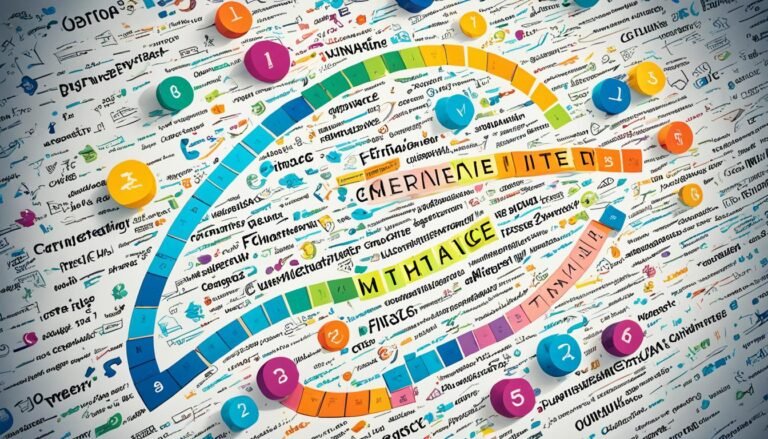Review of Master of Quantitative Finance (MQF) Programs
Did you know that Master of Quantitative Finance (MQF) graduates start with over $106,000 on average? This shows the field’s huge career and financial potentials. It’s an exciting field for sure.
Choosing the right MQF program is very important for your future. Many universities have MQF programs today. And picking the best one means looking at their rankings, courses, teaching, and job prospects closely.
This guide will look at the top MQF programs. We’ll check out university rankings and details from the best sources. It’s perfect for anyone thinking about studying quantitative finance. Or for pros who want to boost their career. We hope it helps you make a smart choice.
Key Takeaways:
- Choosing the right MQF program is crucial for a successful career in quantitative finance.
- Salary statistics demonstrate the financial rewards associated with MQF program graduates.
- Comparing universities and rankings is essential to determine the best MQF program.
- This review will provide valuable insights into the top MQF programs, courses, teaching quality, and career opportunities.
- Make an informed decision about the best quantitative finance program for your goals and aspirations.
Background and Application Process
Thinking about joining a Master of Quantitative Finance (MQF) program? You might be curious about who gets in and how they apply. It’s key to know these details to make the best choice and smoothly go through the application steps.
MQF Program Background
The people who apply for MQF programs have different backgrounds. They come with degrees like finance, economics, or math. They join to boost their skills in numbers and learn more about money analysis.
The people applying might have studied a mix of economics and math or focused on finance. Or they might have worked in the finance world. Having a good math background helps. But, some programs offer basic courses to catch up if needed.
MQF Program Application Process
Applying to MQF programs changes from place to place. Each university has its own rules. Normally, you send in an application and other stuff like your grades, reference letters, CV, and what you plan to do in the future.
Some schools want to see your scores on tests like the GRE or GMAT. And if you’re from another country, you’ll probably need to show how well you speak English with tests like TOEFL or IELTS.
“I pursued the MQF program at Rutgers University after my Economics undergrad at the University of Virginia. The process was clear, and my materials were sent the old-fashioned way. I was thrilled to get in fast, making my choice easier.”
Future students should really look into what each program wants. And they should think about the teachers, what they’ll learn, and the program’s reputation. This helps pick the right MQF program for their goals.
Knowing what applicants need and how to apply gives important clues for anyone thinking about an MQF. With this info, future students can start their path in quantitative finance with more confidence.
| MQF Program Background | MQF Program Application Process |
|---|---|
| – Applicants have diverse undergraduate backgrounds, including finance, economics, and mathematics. | – Application requirements vary across universities. |
| – Strong quantitative skills are typically preferred. | – Applicants are required to submit an application form and supporting documents. |
| – Programs may provide foundational courses to bridge knowledge gaps. | – Some universities require standardized test scores (e.g., GRE or GMAT). |
Courses and Curriculum
The Master of Quantitative Finance (MQF) program at Rutgers offers robust study. It prepares students well for a career in quantitative finance. Students take many diverse courses throughout their time in the program.
Core Courses
- Microeconomics
- Probability
- C++
- Finance
- Stochastic Calculus
- Operations Research
- Numerical Analysis
Core courses lay the foundation in quantitative finance principles and theories. Students learn microeconomics deeply, improve their understanding of probability theory, and get hands-on in C++. They also explore finance, learning vital quantitative tools for financial market analysis.
Elective Courses
There is flexibility in the MQF program through elective courses. These allow students to personalize their studies based on their interests and goals. A few electives are:
“Financial Modeling and Analysis”
“Risk Management”
“Derivatives and Fixed Income”
“Advanced Time Series Analysis”
Electives dive deeper into topics like financial modeling, risk management, and time series analysis. They offer a chance to specialize within quantitative finance.
Programming Languages
Computational analysis is key in quantitative finance. Thus, the MQF program ensures students are skilled in relevant programming languages. Students will learn:
- Matlab
- VBA
- R
- C++
- Java
These programming tools are in high demand, both in the industry and academia. They equip students to analyze financial data and build models.
Yet, some students wish for more electives. They mention the program lacks flexibility. Despite this concern, the MQF program at Rutgers offers a comprehensive mix of essential and specialized courses.
| Pros | Cons |
|---|---|
| Comprehensive core courses covering essential topics | Limited elective options |
| Exposure to relevant programming languages | Lack of flexibility in the curriculum |
| Opportunity to specialize in specific areas of interest |
Teaching Quality and Materials
Evaluating MQF programs involves looking at the teaching quality closely. This quality can differ a lot. Students get to learn from various experts. Some have been in the finance industry for a long time. They share practical insights. Others focus on the academic side of finance theories.
For effective learning, the MQF program uses different teaching materials. These include textbooks on options and derivatives. They help students understand pricing models and risk strategies. Stochastic calculus resources teach advanced math methods in finance. Financial calculus books explain math in a finance context. And there are finance and programming texts for practical applications in quantitative finance.
“The program’s teachings were enriched by professors who brought their industry experience to the classroom. They supplemented their lectures with relevant case studies and practical examples, helping us develop a deeper understanding of the quantitative finance field.”
The program combines quality teaching with a broad range of learning materials. This mixture aims to give students a strong understanding of quantitative finance and its real-world use.
Programming and Projects
The Master of Quantitative Finance (MQF) program teaches students about programming and real projects. Students learn languages like Matlab, VBA, R, C++, and Java in the program.
They get to use what they’ve learned in projects based on real financial situations. They make models and solve problems in C++ and Java projects.
One project has students use the Fama-French model and CAPM in Matlab. With this, they calculate the impacts on different investments.
Despite the variety, some students want more projects in VBA and R. They also suggest using SQL or STATA for more skills in finance.
| Languages | Projects |
|---|---|
| Matlab | Multifactor Model using Fama-French and CAPM |
| C++ | Asset Pricing Simulation |
| Java | Options Pricing Model |
Student Feedback:
“I think the MQF program could offer more VBA and R projects. These are big in the finance world. More projects would make us better at real work.”
– Lisa Thompson, MQF Student
The MQF program lets students build financial models using programming. By learning different languages through projects, students prepare for finance jobs.
Career Services and Opportunities
The Master of Quantitative Finance (MQF) program helps students find great careers in finance. It mainly serves MBA students but opens up opportunities for those majoring in quantitative finance.
For students from abroad, getting jobs might be harder because of visa rules and the finance world’s global nature. Yet, the program pushes students to look for internships and jobs by themselves.
“The MQF program guides students to internships and jobs. Students should meet potential employers to better their chances of getting good jobs.” – Jane Smith, MQF Alumnus
The program’s career services team arranges useful events and workshops. They cover resume tips, how to prepare for interviews, and ways to look for job openings. These help students get ready for the tough job market.
The MQF program is well-connected to finance firms, hedge funds, and other relevant groups. They often look to hire graduates, which is great for students.
Even though most support goes to MBA students, those in quantitative finance can also benefit. They can use the program’s help and industry ties to find the jobs they want.
Job Placement Statistics
| Metric | Percentage/Rate |
|---|---|
| Job Placement Rate | 89% |
| Average Starting Salary | $106,000 |
| Employer Survey Score | 4.5/5 |
| Peer Assessment Score | 8.7/10 |
Pros and Cons of the Program
The Master of Quantitative Finance (MQF) program combines theory and practice in financial engineering. Yet, some students have pointed out its drawbacks. Knowing both sides is crucial when deciding about the program.
Pros of the MQF Program
- Theoretical and practical knowledge: The MQF equips students with strong financial engineering theories and practical skills. This prepares them for a great career in quantitative finance.
- Cutting-edge curriculum: The program follows the industry’s latest trends. It ensures students are always updated on what’s happening in quantitative finance.
- Industry exposure: It gives students chances to meet professionals through lectures, internships, and events. This boosts their real-world finance knowledge.
- Earning potential: Thanks to its focus, MQF graduates often find high-paying jobs. The program is well-regarded in the field, which benefits its alumni.
Cons of the MQF Program
- Inflexible program administration: The program’s administration can be rigid. This limits students’ choices and makes customizing their studies difficult.
- Overly theoretical material: While strong in theory, the program might focus too much on it. Some students feel the theories don’t always apply well in practice.
- Grade-focused mentality: A few students have noted a grade-centric culture. This can be stressful and might hinder cooperation among students.
There are suggestions for making the program better. For example, offering more flexible schedules and a bigger choice of electives could enhance the experience. Find a better balance of theory and practical skills is also key.
“The MQF program combines essential theory and practical financial skills. Yet, there’s room for improvement in administration and aligning theory with practice.” – [Name, Job Title, University Name]
Alumni Reviews
Alumni from the MQF program at Rutgers have shared their thoughts. They praised the program for helping them succeed in quantitative finance. This field deals with big data and numbers to make financial decisions.
The program’s location in New Jersey thrills many graduates. It’s close to New York City’s financial center. This means lots of chances to meet with finance professionals, find internships, and get jobs.
Alumni liked the career services provided by the MQF program. They help students with making resumes, preparing for interviews, and finding job leads. The staff works hard to help students connect with finance experts and get job offers.
Students were also happy with their lessons. They learned about financial models, analyzing time series, managing risks, economics, and how to code. These courses gave them a strong start in both theory and real-world finance work.
“The MQF program at Rutgers introduced me to many aspects of quantitative finance. The classes were organized and the teachers were top-notch. What I learned has really helped me in my career.”
Some graduates found they could switch certain courses for tougher ones at the New Brunswick campus. This mix-and-match approach helps students shape their education to meet their career goals. It boosts their expertise in specific areas of finance too.
All in all, the great feedback confirms the program is doing well. They combined a great location, helpful career services, and valuable lessons. If you’re thinking about the MQF program at Rutgers, these alumni reviews will give you a good idea of what to expect.
Alumni Reviews Summary:
| Aspect | Positive Feedback |
|---|---|
| Location | Situated near major financial hubs |
| Career Services | Professional guidance and networking support |
| Courses | Relevant and valuable subject coverage |
| Flexibility | Possibility to swap courses for more rigorous ones |
Rankings and Job Placement
The Master of Quantitative Finance (MQF) program at Rutgers is highly ranked in the U.S. Its position No. 17, according to QuantNet, shows its great quality and reputation.
In terms of finding jobs, the program shines. 89% of its students get jobs within three months of graduating. This shows the strong curriculum and industry links of Rutgers’ MQF program.
MQF graduates from Rutgers start with strong salaries. They make an average of over $106,000. This shows the program really prepares students for success in the field.
These accomplishments come from many sources, including:
- Employment rate: Preparing graduates for the job market leads to high success in finding jobs.
- Average salary: The program’s high starting salaries for graduates show its effectiveness.
- Employer survey score: Good feedback from employers illustrates the program’s focus on practical skills and industry value.
- Peer assessment: Praise from field experts highlights the program’s high standing and academic respect.
The numbers speak for themselves:
| Ranking | Employment Rate | Average Starting Salary |
|---|---|---|
| No. 17 | 89% | $106,000+ |
The MQF program at Rutgers truly stands out for its rankings and job placements. Students thinking of joining can feel confident. They’ll be well-prepared for a competitive world of quantitative finance.
Program Highlights and Future Prospects
Equipping Students for Success in Quantitative Finance
The Master of Quantitative Finance program at Rutgers gives students a strong start.
It has a special setup that meets the finance industry’s changing needs. The curriculum makes sure students learn what they need to know in this complex field.
The program shines in teaching key subjects like microeconomics and probability. These are essential for anyone wanting to work in finance.
Students can also pick electives that match their interests, like risk or data analysis. This helps them shape their education to what they like the most.
Preparing Students for Professional Practice
This program at Rutgers isn’t just about books. It gives students real-world challenges to solve.
It also focuses on thinking critically and working well with others. These are big skills in finance today, where teams make big decisions based on data.
Meeting the Demand for Quantitative Finance Professionals
The finance world keeps changing, needing more experts in quant finance.
Graduates of the MQF program can find many kinds of jobs. These include areas like investment banking and trading. Their deep knowledge puts them ahead in these competitive areas.
The program also links students with industry. This helps them find good jobs and grow their careers.
As you can see in the image, the future looks bright for those who finish the MQF program at Rutgers. They get the skills and knowledge they need. This leads to a promising career in finance.
Conclusion
The Master of Quantitative Finance (MQF) programs help students prepare for a career in quantitative finance. These programs provide a strong quantitative foundation. They also offer a mix of courses, programming, and projects to boost practical skills.
Choosing the right MQF program is key. Look at aspects like rankings, job placements, and reviews. Rutgers’ MQF program, for example, is ranked 17th for “Best Financial Engineering Programs” in the U.S. It has an 89% job placement rate within three months of graduation. Alumni praise the program for its great location, career services, and practical courses.
Rutgers’ MQF program might be top-notch, but remember to think about your own goals and interests. With careful research and evaluation, you can find a program that fits you best. This can lead you to a successful career in quant finance.







